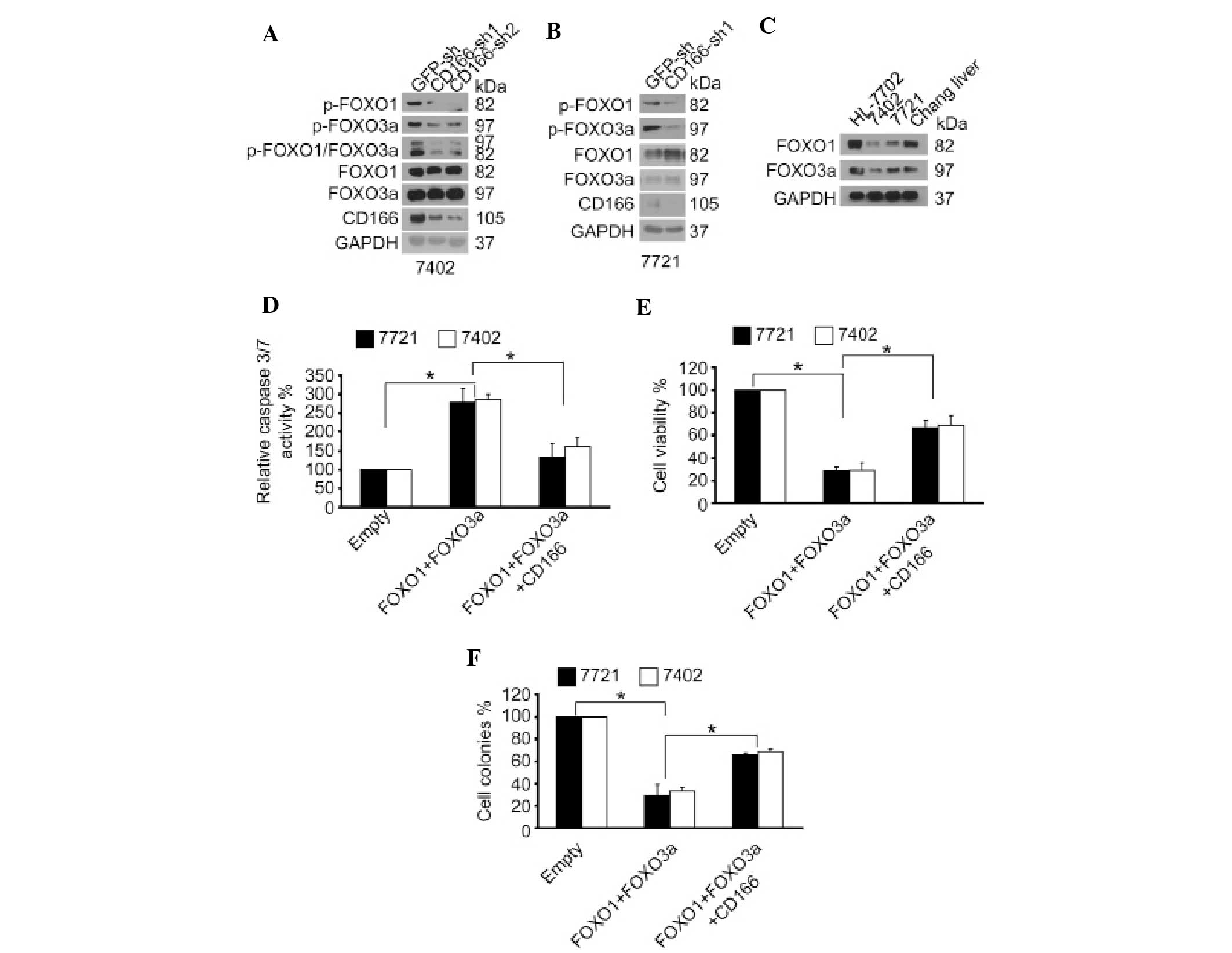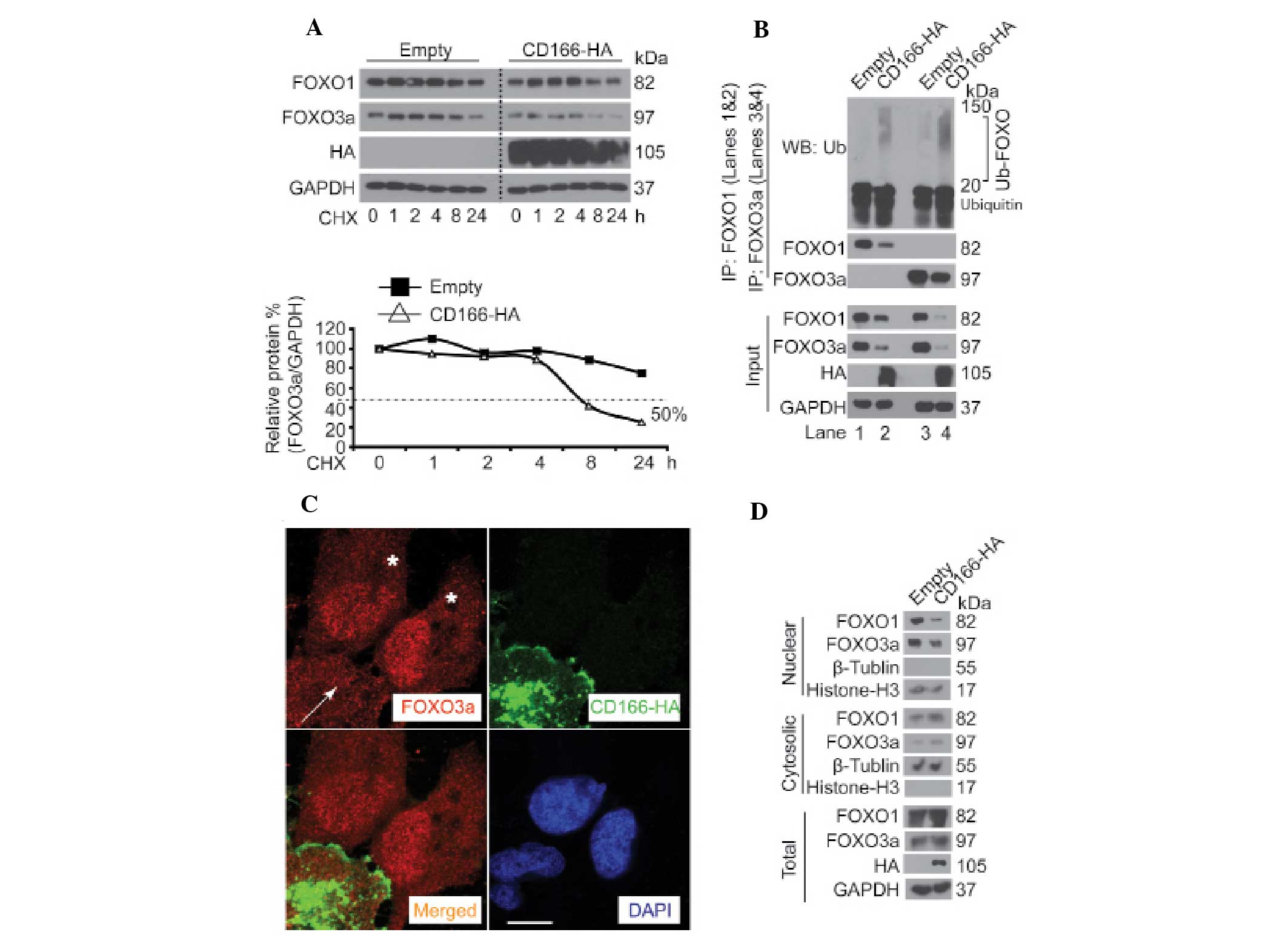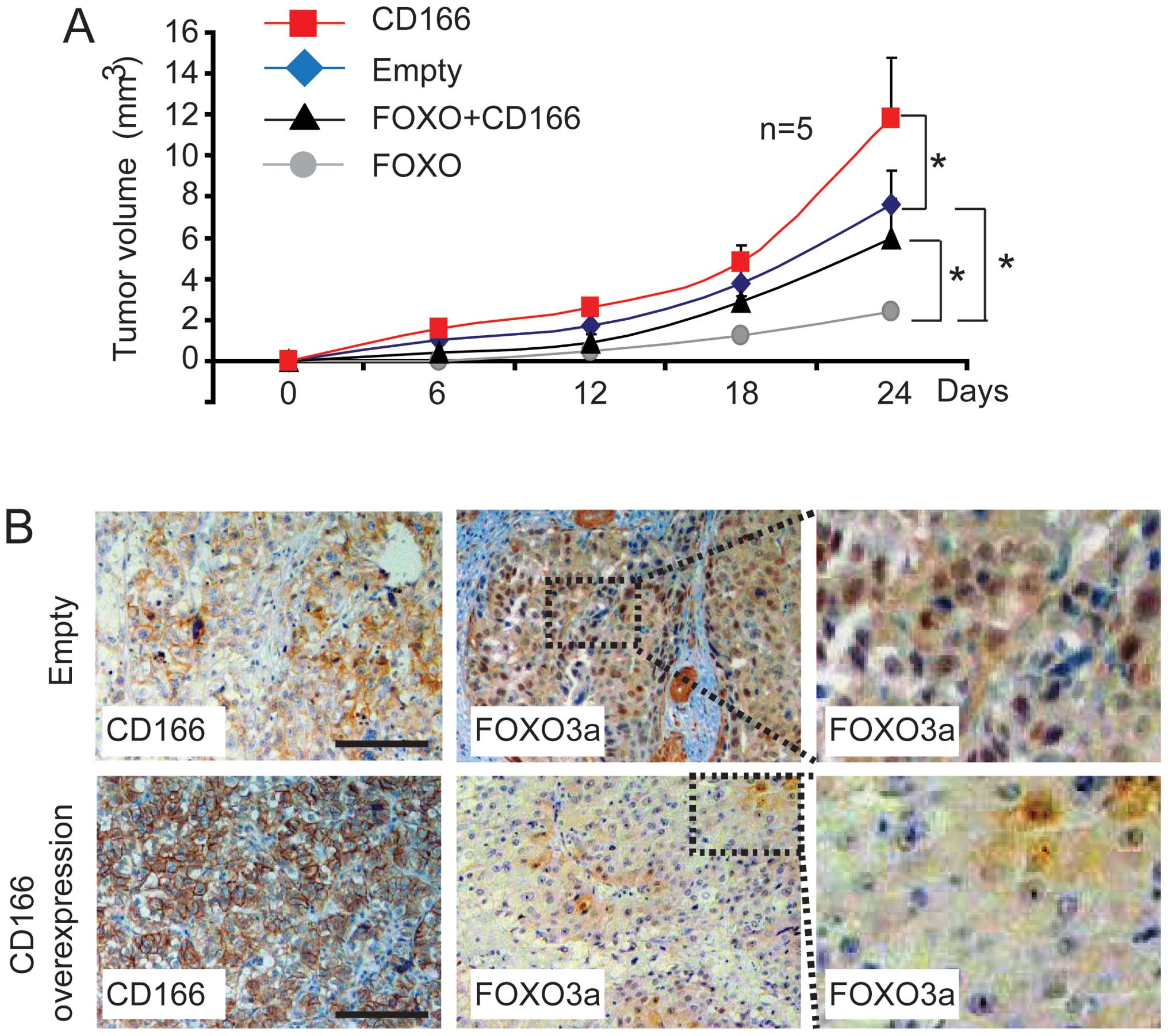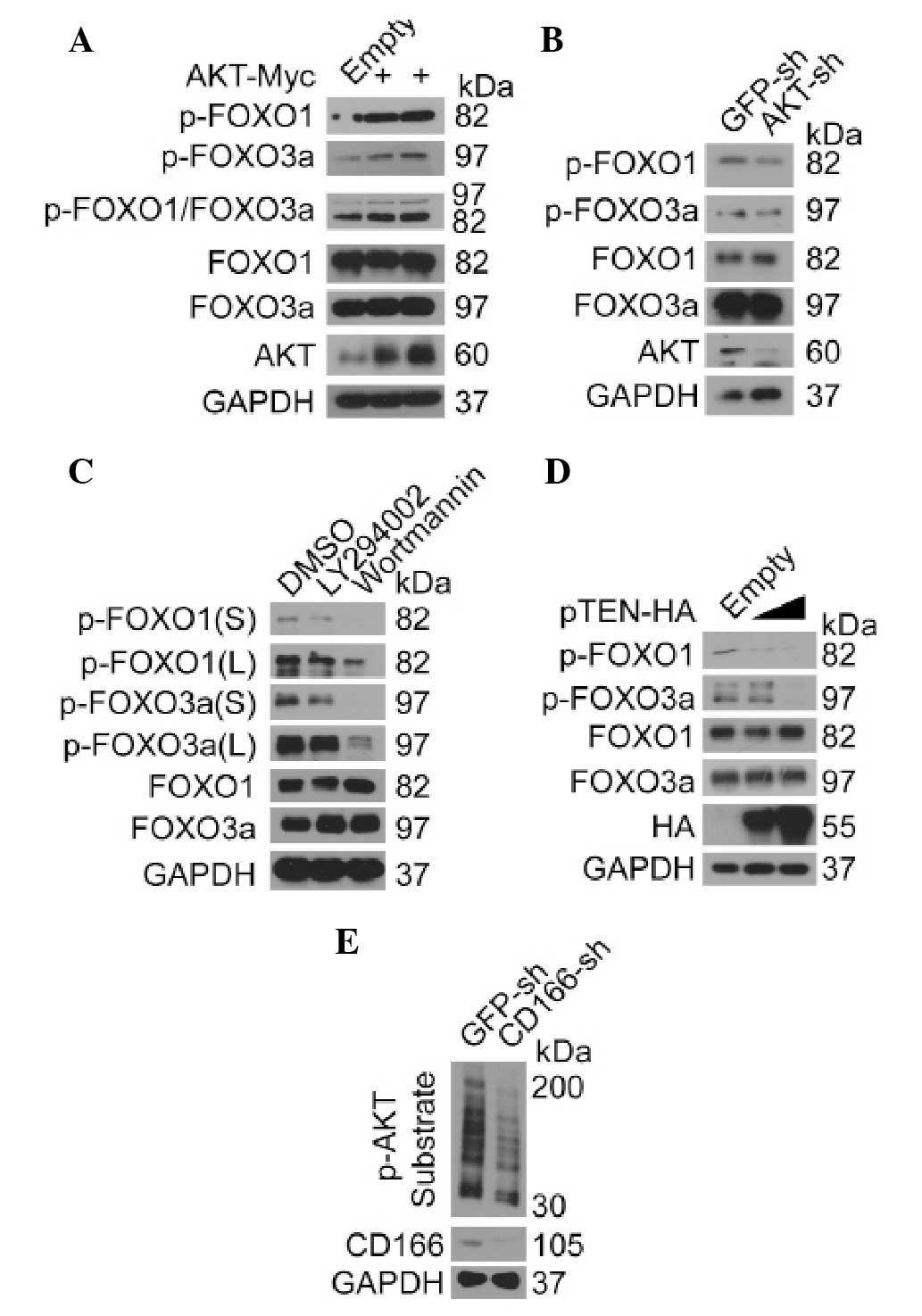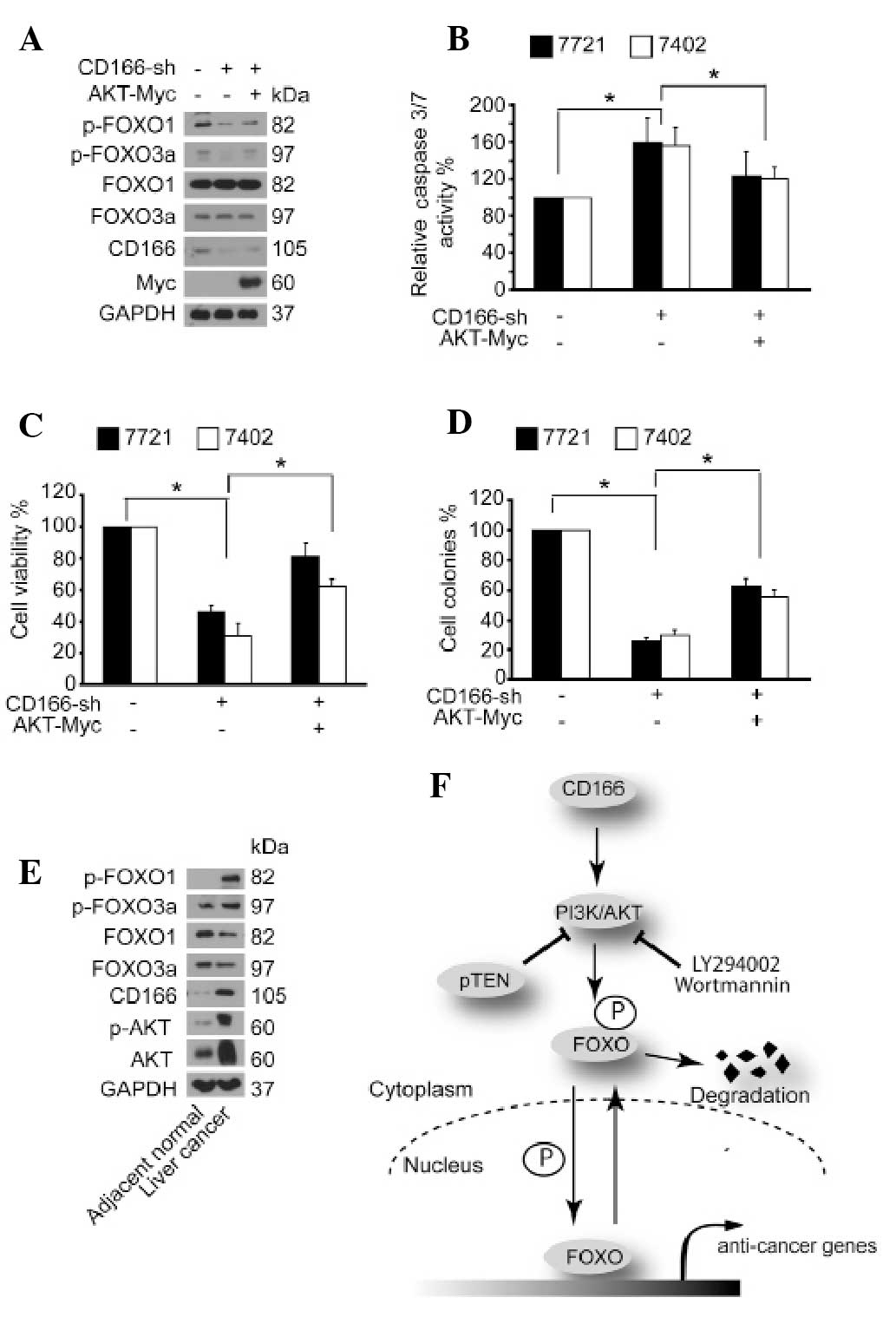|
1
|
van Kempen LC, Nelissen JM, Degen WG,
Torensma R, Weidle UH, Bloemers HP, Figdor CG and Swart GW:
Molecular basis for the homophilic activated leukocyte cell
adhesion molecule (ALCAM)-ALCAM interaction. J Biol Chem.
276:25783–25790. 2001.PubMed/NCBI
|
|
2
|
Weichert W, Knösel T, Bellach J, Dietel M
and Kristiansen G: ALCAM/CD166 is overexpressed in colorectal
carcinoma and correlates with shortened patient survival. J Clin
Pathol. 57:1160–1164. 2004. View Article : Google Scholar : PubMed/NCBI
|
|
3
|
Burkhardt M, Mayordomo E, Winzer KJ,
Fritzsche F, Gansukh T, Pahl S, Weichert W, Denkert C, Guski H and
Dietel MG: Cytoplasmic overexpression of ALCAM is prognostic of
disease progression in breast cancer. J Clin Pathol. 59:403–409.
2006. View Article : Google Scholar : PubMed/NCBI
|
|
4
|
Kahlert C, Weber H, Mogler C, Bergmann F,
Schirmacher P, Kenngott HG, Matterne U, Mollberg N, Rahbari NN,
Hinz U, Koch M, Aigner M and Weitz J: Increased expression of
ALCAM/CD166 in pancreatic cancer is an independent prognostic
marker for poor survival and early tumour relapse. Br J Cancer.
101:457–464. 2009. View Article : Google Scholar : PubMed/NCBI
|
|
5
|
Jezierska A, Matysiak W and Motyl T:
ALCAM/CD166 protects breast cancer cells against apoptosis and
autophagy. Med Sci Monit. 12:BR263–BR273. 2006.PubMed/NCBI
|
|
6
|
Wang J, Gu Z, Ni P, Qiao Y, Chen C, Liu X,
Lin J, Chen N and Fan Q: NF-κB P50/P65 hetero-dimer mediates
differential regulation of CD166/ALCAM expression via interaction
with micoRNA-9 after serum deprivation, providing evidence for a
novel negative auto-regulatory loop. Nucleic Acids Res.
39:6440–6455. 2011.
|
|
7
|
Ma L, Wang J, Lin J, Pan Q, Yu Y and Sun
F: Cluster of differentiation 166 (CD166) regulated by
phosphatidylinositide 3-kinases (PI3K)/AKT signaling to exert its
anti-apoptotic role via yes associated protein (YAP) in liver
cancer. J Biol Chem. Jan 30–2014.(Epub ahead of print). View Article : Google Scholar
|
|
8
|
Zhang X, Tang N, Hadden TJ and Rishi AK:
Akt, FoxO and regulation of apoptosis. Biochim Biophys Acta.
1813:1978–1986. 2011. View Article : Google Scholar : PubMed/NCBI
|
|
9
|
Medema RH, Kops GJ, Bos JL and Burgering
BM: AFX-like Forkhead transcription factors mediate cell-cycle
regulation by Ras and PKB through p27kip1. Nature.
404:782–787. 2000. View
Article : Google Scholar : PubMed/NCBI
|
|
10
|
Urbich C, Knau A, Fichtlscherer S, Walter
DH, Brühl T, Potente M, Hofmann WK, de Vos S, Zeiher AM and
Dimmeler S: FOXO-dependent expression of the proapoptotic protein
Bim: pivotal role for apoptosis signaling in endothelial progenitor
cells. FASEB J. 19:974–976. 2005.PubMed/NCBI
|
|
11
|
Carbajo-Pescador S, Mauriz JL,
García-Palomo A and González-Gallego J: FoxO proteins: regulation
and molecular targets in liver cancer. Curr Med Chem. 21:1231–1246.
2014. View Article : Google Scholar : PubMed/NCBI
|
|
12
|
Wang J, Ma L, Weng W, Qiao Y, Zhang Y, He
J, Wang H, Xiao W, Li L, Chu Q, Pan Q, Yu Y and Sun F: Mutual
interaction between YAP and CREB promotes tumorigenesis in liver
cancer. Hepatology. 58:1011–1020. 2013. View Article : Google Scholar : PubMed/NCBI
|
|
13
|
You H, Yamamoto K and Mak TW: Regulation
of transactivation-independent proapoptotic activity of p53 by
FOXO3a. Proc Natl Acad Sci USA. 103:9051–9056. 2006. View Article : Google Scholar : PubMed/NCBI
|
|
14
|
Yamashita M, Ying SX, Zhang GM, Li C,
Cheng SY, Deng CX and Zhang YE: Ubiquitin ligase Smurf1 controls
osteoblast activity and bone homeostasis by targeting MEKK2 for
degradation. Cell. 121:101–113. 2005. View Article : Google Scholar : PubMed/NCBI
|
|
15
|
Sapkota G, Alarcon C, Spagnoli FM,
Brivanlou AH and Massague J: Balancing BMP signaling through
integrated inputs into the Smad1 linker. Mol Cell. 25:441–454.
2007. View Article : Google Scholar : PubMed/NCBI
|
|
16
|
Fu Z and Tindall DJ: FOXOs, cancer and
regulation of apoptosis. Oncogene. 27:2312–2319. 2008. View Article : Google Scholar : PubMed/NCBI
|
|
17
|
Hales EC, Taub JW and Matherly LH: New
insights into Notch1 regulation of the PI3K-AKT-mTOR1 signaling
axis: targeted therapy of γ-secretase inhibitor resistant T-cell
acute lymphoblastic leukemia. Cell Signal. 26:149–161.
2014.PubMed/NCBI
|
|
18
|
Lin A, Yao J, Zhuang L, Wang D, Han J and
Lam EW; TCGA Research Network and Gan B. The FoxO-BNIP3 axis exerts
a unique regulation of mTORC1 and cell survival under energy
stress. Oncogene. Jul 15–2013.(Epub ahead of print). View Article : Google Scholar
|
|
19
|
Tao GZ, Lehwald N, Jang KY, Baek J, Xu B,
Omary MB and Sylvester KG: Wnt/β-catenin signaling protects mouse
liver against oxidative stress-induced apoptosis through the
inhibition of forkhead transcription factor FoxO3. J Biol Chem.
28:17214–17224. 2013.
|
|
20
|
Yusuf I, Zhu X, Kharas MGs, Chen J and
Fruman DA: Optimal B-cell proliferation requires phosphoinositide
3-kinase-dependent inactivation of FOXO transcription factors.
Blood. 104:784–787. 2004. View Article : Google Scholar : PubMed/NCBI
|
|
21
|
Wang J, Zhang Y, Weng W, Qiao Y, Ma L,
Xiao W, Yu Y, Pan Q and Sun F: Impaired phosphorylation and
ubiquitination by p70 S6 kinase (p70S6K) and smad ubiquitination
regulatory factor 1 (Smurf1) promote tribbles homolog 2 (TRIB2)
stability and carcinogenic property in liver cancer. J Biol Chem.
288:33667–33681. 2013. View Article : Google Scholar : PubMed/NCBI
|
|
22
|
Wang J, Park JS, Wei Y, Rajurkar M, Cotton
JL, Fan Q, Lewis BC, Ji H and Mao J: TRIB2 acts downstream of
Wnt/TCF in liver cancer cells to regulate YAP and C/EBPα function.
Mol Cell. 51:211–225. 2013.PubMed/NCBI
|
|
23
|
Zanella F, Renner O, García B, Callejas S,
Dopazo A, Peregrina S, Carnero A and Link W: Human TRIB2 is a
repressor of FOXO that contributes to the malignant phenotype of
melanoma cells. Oncogene. 29:2973–2982. 2010. View Article : Google Scholar : PubMed/NCBI
|
|
24
|
Manning BD and Cantley LC: AKT/PKB
signaling: navigating downstream. Cell. 129:1261–1274. 2007.
View Article : Google Scholar : PubMed/NCBI
|















